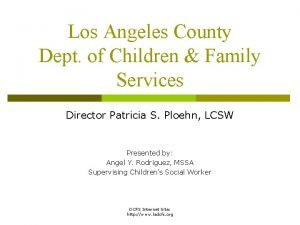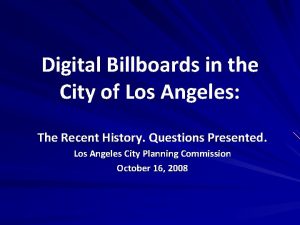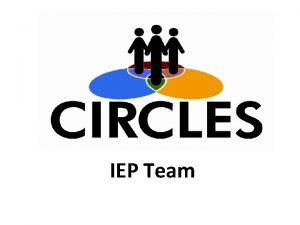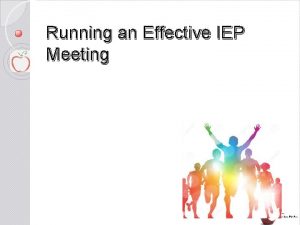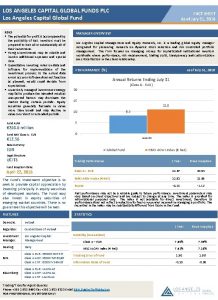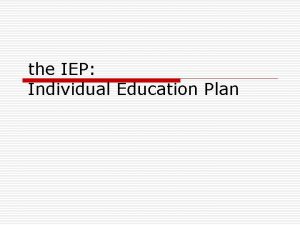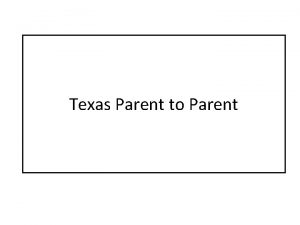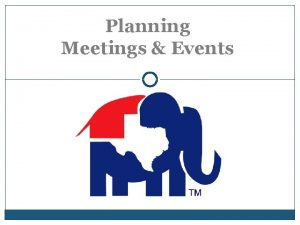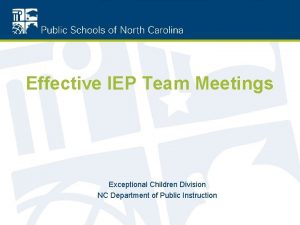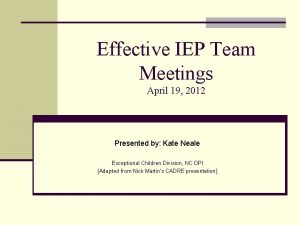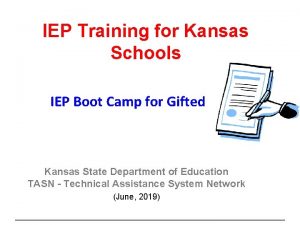Parent Participation at IEP Team Meetings Los Angeles






































- Slides: 38

Parent Participation at IEP Team Meetings Los Angeles Unified School District Division of Special Education

Why is Parent Participation Important? l Student achievement is improved l Children tend to do well in school and continue their education l Greater effect on achievement than more general forms of involvement

Background l l Compulsory education laws in all states, 1918 Brown v. Board of Education, 1954 Passage of PL 94 - 142 (The Education for All Handicapped Act), 1975 l Parents as partners Reauthorization of IDEA, 1997 & 2004 l Parents as equal partners

Individuals with Disabilities Education Act (IDEA) l Free Appropriate Public Education (FAPE) l Least Restrictive Environment (LRE) The IEP and You, p. 1

Least Restrictive Environment (LRE) l The law states: l l l Students must be educated in the general curriculum and/or Participate in activities with other students who are not disabled To the maximum extent appropriate The IEP and You, p. 4 -5

Least Restrictive Environment (LRE) l Include any necessary accommodations, modifications, and/or supports to involve student in general education curriculum l Explain how often student will not participate in general education curriculum The IEP and You, p. 4 -5

Least Restrictive Environment (LRE) l Continuum of placement options l l l l General education classroom with in-class special education support (RSP) General education classroom with out-of-class special education support Special education classroom (SDP) Special Education Schools / Career and Vocational Centers Nonpublic school (NPS) Home/Hospital The IEP and You, p. 4 -5 State residential school

Frequency of IEP Team Meetings l Initial l Annual l Three-year

IEP Timelines l l 60 days after parent signature and consent on Assessment Plan 30 days after parent requests 30 days for students new to the District who are receiving special education services At a minimum of once per year

Parent Notification of IEP Team Meeting l 10 days prior to IEP meeting l Date, time, & location l Purpose l Participants

Parent Notification of IEP Team Meeting Parents may: l Attend, reschedule or consent to proceed with the IEP in their absence l Request an interpreter l Request copies of assessment reports before the IEP meeting l Ask that independent education evaluation (IEE) be considered l Sign & return notification form to school

Before the IEP Team Meeting l Look at recent information about your child’s progress l Review your child’s current IEP l Go over important information that you want to share at the IEP meeting The IEP and You, p. 2

Before the IEP Team Meeting l Give copies to the school of any recent private evaluation reports you want to share with the IEP team l Talk to your child l Visit your child’s school and meet with teachers to talk about your child’s progress The IEP and You, p. 2

Before the IEP Team Meeting l Write down questions you want to ask, thoughts, and/or concerns l Review and return the “Notification to Participate in an IEP Meeting” l Fill out a “Parent Request for Reasonable Accommodations” form The IEP and You, p. 2

Before the IEP Team Meeting l Review “A Parent’s Guide to Special Education Services (Including Procedural Rights and Safeguards)” l Review the “ITP and You” if you have a child 14 years or older The IEP and You, p. 2

Before the IEP Team Meeting l School’s staff responsibilities: l Arrange for an interpreter l Invite District IEP team members, as needed l Ensure school staff are prepared and will attend the IEP team meeting

During the IEP Team Meeting l Parents should: l Share information about your child l Ask questions or ask for explanations of special education terms that you do not understand l Help in the design of an educational plan to meet your child’s individual needs The IEP and You, p. 3

During the IEP Team Meeting l IEP document will be developed, reviewed, and/or revised l Required participants l l Parent/guardian School administrator/designee Special education teacher General education teacher The IEP and You, p. 3

During the IEP Team Meeting l Additional participants l l l Others with knowledge or special expertise about your child Child, if appropriate Representatives from outside agencies Interpreter, if requested Excusal from IEP team meeting, with parent consent The IEP and You, p. 3

Use of an Oral Interpreter l Parents are encouraged to: l l l Introduce yourself to interpreter Sit next to interpreter Procedures for using interpreter will be explained Ask questions when you require clarification Make notations or write questions

Use of an Oral Interpreter is communicator of information l Role of interpreter is neutral l Refrain from sidebar conversations (opinions) l Speak one person at a time l Maintain eye contact and refer comments to appropriate IEP team member

During the IEP Team Meeting l Distribution of documents: l “The IEP and You” l “A Parent’s Guide to Special Education Services (Including Procedural Rights and Safeguards)” l “The ITP and You”, if your child is 14 years or older The IEP and You, p. 3

During the IEP Team Meeting Sample Agenda l Start-up l l l l Welcome/Introductions Signatures of people present Overview/Purpose of Meeting/Time Constraints Ground Rules Decision Making Process Parent Rights IEP Development l l l l Present Levels of Performance Eligibility Recommend/Establish Goals & Objectives Supports & Services Placement in the LRE Offer of FAPE Consent Next Steps The IEP and You, p. 3

The IEP Document l Present levels of performance (PLP) l Eligibility for special education services l Measurable goals and objectives l Progress reporting The IEP and You, p. 6 -7

The IEP Document l Special education services l Related services l Accommodations/modifications l Supplementary aids/supports The IEP and You, p. 6 -7

The IEP Document l Delivery of services l State/District assessments l Master Plan for English language learners l Individual Transition Plan l Transfer of rights The IEP and You, p. 6 -7

IEP/ITP Transition Team Work Experience Advisors Transition Teachers Administrators Career Advisors Agencies Special Education Teachers STUDENT School Psychologist College Advisors Nurse Parents General Education Teachers Transition Facilitator

Age of Majority – 18 years l. Parents make decisions about the student’s educational program until age of 18. l. When the student turns 18, educational rights transfer to the student. l. Parents and students must be informed of this transfer of rights. l This is documented on the IEP/ITP at least one year before the student turns 18.

At the Conclusion of the IEP Team Meeting l Administrator/Administrator designee will: l Summarize decisions l Offer free appropriate public education (FAPE) The IEP and You, p. 8

At the Conclusion of the IEP Team Meeting l Parents may: l Consent to IEP l l l Sign and date OR May take home IEP to review before signing Disagree with the IEP l l l Clarify areas of disagreement and agreement Try to work out the disagreement Document comments/concern The IEP and You, p. 8

At the Conclusion of the IEP Team Meeting l Disagreements: l l l Parent may disagree with any part or all of the IEP School staff will again review your rights If you agree with certain sections of IEP, those services can begin with your written consent IMPORTANT! No part of the new IEP will be implemented without your written consent

Options for Disagreement The Dispute Resolution Process l Informal Dispute Resolution l Mediation Only l Due Process If an IEP is not being implemented l File a State Complaint

At the Conclusion of the IEP Team Meeting l Parents will be: l Provided with a copy of IEP l l An offer to translate IEP will be made Provide Parent Input Survey The IEP and You, p. 8

After the IEP Team Meeting l School will: l Implement IEP or parts you consent to l Distribute copies of IEP l Provide progress towards IEP goals and objectives at site determined reporting periods l Review the IEP at least once a year The IEP and You, p. 9

Accessing Children’s Educational Records l The parent has the right to inspect and review all educational records within (5) business days of your written request.

Parent Resources l Your child’s teachers l Administrators at your child’s school l Special Education Service Centers l LAUSD Special Education website l http: //sped. lausd. net The IEP and You, p. 10 -11

Parent Resources l l Community Advisory Committee (CAC) l 1 -213 -241 -6701 Complaint Response Unit/Parent Resource Network (CRU/PRN) l 1 -800 -933 -8133 The IEP and You, p. 10 -11

Questions and Answers Thank You!
 More bloody meetings
More bloody meetings Meetings, bloody meetings
Meetings, bloody meetings Meetings bloody meetings 5 points
Meetings bloody meetings 5 points Simbol weak entity
Simbol weak entity Aunque hablara la lengua de los angeles
Aunque hablara la lengua de los angeles Iep development
Iep development Different classes of submarines
Different classes of submarines Diagnostic rge
Diagnostic rge My sis harbor college
My sis harbor college Child welfare services
Child welfare services Rdox los angeles
Rdox los angeles Dra roselyn valerin
Dra roselyn valerin Tracking upa
Tracking upa Comet los angeles
Comet los angeles Los angeles schools
Los angeles schools Los angeles position
Los angeles position Los angeles schools
Los angeles schools Los angeles oesophagitis classification
Los angeles oesophagitis classification Los angeles angie rupert
Los angeles angie rupert Los angeles oesophagitis classification
Los angeles oesophagitis classification Cottage law los angeles
Cottage law los angeles City of los angeles department of recreation and parks
City of los angeles department of recreation and parks Builtrite industries
Builtrite industries Redlining los angeles
Redlining los angeles Whole person care los angeles
Whole person care los angeles Rozloha usa
Rozloha usa Poly language institute los angeles
Poly language institute los angeles Distancia de los angeles a napa valley
Distancia de los angeles a napa valley Lacc math sequence
Lacc math sequence Parroquia san estanislao de kostka
Parroquia san estanislao de kostka Kalifornie rozloha
Kalifornie rozloha Cccco guided pathways
Cccco guided pathways Residencia medinaceli getafe
Residencia medinaceli getafe Fatih uckun
Fatih uckun Digital billboards los angeles
Digital billboards los angeles Maria de los angeles fortis barrera
Maria de los angeles fortis barrera Csc los angeles canvas
Csc los angeles canvas Los angeles lookout points
Los angeles lookout points Poisoning the well fallacy
Poisoning the well fallacy









